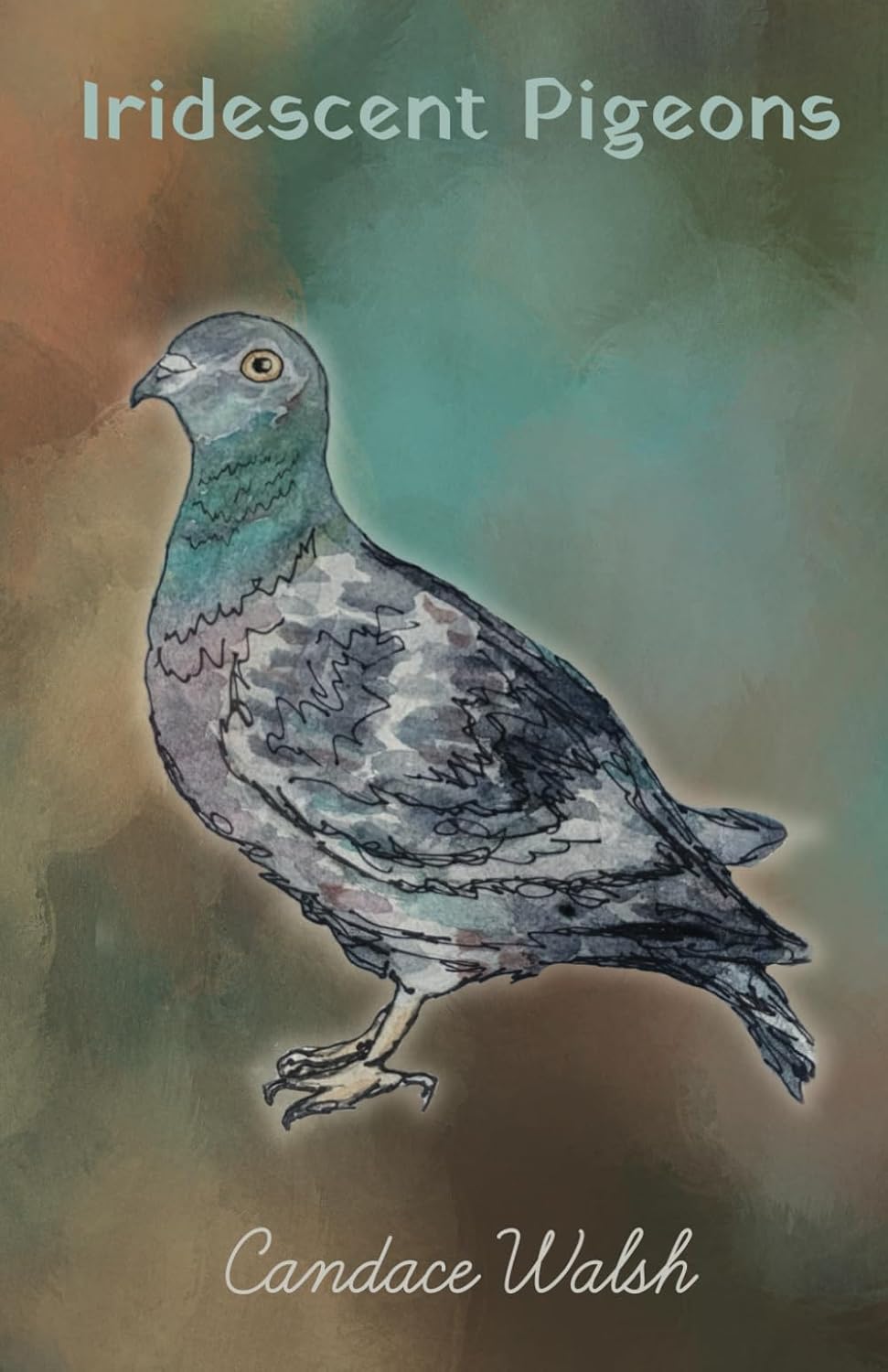Review of Iridescent Pigeons by Candace Walsh

Iridescent Pigeons
Candace Walsh
Yellow Arrow Publishing, 2024, 82 pages
$17.99
Reviewed by Pelaya Arapakis
Iridescent Pigeons is a fitting title for Candace Walsh’s enchanting debut—a body of work that ponders the many contours of love, that rejoices in the splendour of the everyday and the profound beauty of the overlooked and discounted. In this chapbook, Walsh traverses seamlessly across time and poetic forms, tracing themes of queer love, desire, nature, loss, motherhood, childhood, and the engravings of trauma. Each poem teems with life, beckoning readers to take a second glance, to embrace stillness, drawing us into a heightened state of awareness of ourselves and the environment around us.
Images of nature abound in Iridescent Pigeons as Walsh revels in both the fecundity and the awe-inspiring intricacies of ecological design. In “Then Suddenly I Know” Walsh exults the healing properties bestowed by nature: “Sometimes I can’t get back to sleep, / while lemon balm breathes / let me soothe you beyond the window screen / and frogsong trembles webs seedpearled with dew” (40). Walsh’s poems unveil worlds within worlds that only begin to unfurl to those who remain attentive and curious, to those “who do not shirk from hills and swerves and barks” (17). However, nature is not just a physical phenomenon in these poems, but a site of memory imbued with deep evocative power.
Walsh pays homage to the many queer women poets who came before her, thus situating her work as part of a long lineage of lesbian and queer love poetry and writing. Virginia Woolf is celebrated in Walsh’s cento “Wild and Frail and Beautiful,” composed of lines from Woolf’s third novel, Jacob’s Room. Woolf is again invoked in the poem “I Want To See You in the Lamplight, in Your Emeralds,” (21) the very title of which is a sentence from a love letter written by Woolf to Vita Sackville-West in 1927. The influence of Sappho is also apparent in Walsh’s use of the sapphic stanza. Midway through the collection, “Sapphic stanza 1,” “Sapphic stanza 2,” and “Sapphic stanza 3” connect readers directly to this vibrant queer legacy of desire-driven poetry. Indeed, much of Sappho’s oeuvre today only exists in fragments, and Walsh’s completed compositions can be read not only as a commemoration of the poet, but as a process of historical restoration. However, Sappho’s impact extends beyond poetic form to Walsh’s use of the natural world as a metaphor for queer love and sensuality. In the poem “Not Fell but Fall” Walsh muses, “How do oceans feel / about these languid vagabonds? / Against her skin I knew, I think, / how seaweed feels. / The sea must feel a thing like love” (5).
Iridescent Pigeons speaks to how queer women have historically articulated desire for one another in coded ways, negotiating through a labyrinth of social hostility and marginalisation. Walsh’s poem “Lesbians and Their Dogs” poignantly reflects on this reality: “I think of dogs with docked tails, / their bumpy rumps wagging nothing. / It reminds me of queer love, / how they used to try to / cut off or drug-numb what offended, / how we sniffed out the invisible / and guess-read the signals” (59). These lines honour the lesbians and queer women throughout history who have loved quietly, transgressively, and ferociously in spite of structures that sought/seek to deny our longings and desires. We continue to love because “We know how much it costs / to cut it off” (59).
Pelaya Arapakis (she/her) is a musician, arts worker, and freelance writer based in Naarm/Melbourne.
"Empowerment comes from ideas."
― Charlene Carruthers
"Your silence will not protect you."
— Tourmaline
"Gender is the poetry each of us makes out of the language we are taught."
— Leila Raven


